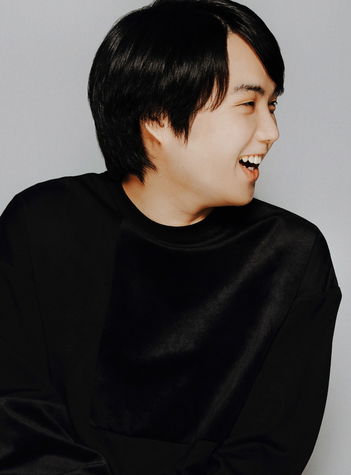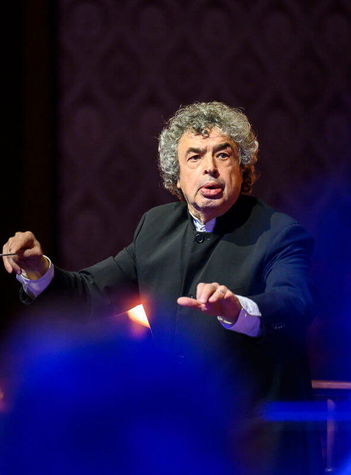Programme
Richard Strauss
Burlesque for piano and orchestra in D minor, TrV 145
Dmitri Shostakovich
Symphony No. 8 in C minor, Op. 65
Secure your seat for the 2025/2026 season – presales are open.
Choose SubscriptionIt has been 80 years since the end of the Second World War and 50 since the death of Shostakovich. In commemoration of both, we will hear the composer’s Eighth Symphony, performances of which were banned in the Soviet Union because of its bleakness. First, however, making his return to the Rudolfinum in Strauss’s Burleske is Mao Fujita, whom critics call a rising world-class pianist.
Subscription series A
Richard Strauss
Burlesque for piano and orchestra in D minor, TrV 145
Dmitri Shostakovich
Symphony No. 8 in C minor, Op. 65
Mao Fujita piano
Semyon Bychkov conductor
Czech Philharmonic

“I feel eternal pain for those who were killed by Hitler, but I feel no less pain for those killed on Stalin’s orders. I suffer for everyone who was tortured, shot, or starved to death. There were millions of them in our country before the war with Hitler began. The war brought much new sorrow and much new destruction, but I haven’t forgotten the terrible pre-war years. That is what my symphonies are about, including Number Eight.”
– Testimony: The Memoirs of Dmitri Shostakovich
It is no wonder that Shostakovich preferred to discuss his Eighth Symphony publicly only as an attempt to depict the tragedy of the Second World War, which took the lives of millions of Russians. The work’s gloomy mood was ill suited for the Soviet regime’s propaganda. The symphony was withdrawn from the repertoire, and it was officially banned in 1948. It did not return to concert halls until eight years later.
Richard Strauss’s Burleske for piano and orchestra did not have an easy time reaching listeners either. The young composer wrote the work originally titled Scherzo in D minor in 1886 for the pianist and conductor Hans von Bülow, who had secured the still youthful Strauss a conducting post with the Meiningen Court Orchestra.
Bülow, however, called the work unplayable and refused to learn it. Ultimately, the composer himself played the solo part in Meiningen. The work waited three years for its next performance, when the pianist Eugen d’Albert persuaded Strauss to simplify the piece, earning the dedication of the revised version of the Scherzo, now with its new title Burleske.
This is not the first encounter between the Japanese pianist Mao Fujita and the Czech Philharmonic. In 2023, he took part in a tour of Asia with the orchestra and Semyon Bychkov. He again played Dvořák’s Piano Concerto under Jakub Hrůša’s baton at the BBC Proms at Royal Albert Hall in August 2024. A month later, he gave a recital at Prague’s Rudolfinum.
Mao Fujita piano

With an innate musical sensitivity and naturalness to his artistry, 26-year old pianist Mao Fujita has already impressed many leading musicians as one of those special talents which come along only rarely, equally at home in Mozart as the major romantic repertoire.
Born in Tokyo, he began piano lessons at the age of five and won his first international prize in 2010 at the World Classic in Taiwan. While still studying at the Tokyo College of Music in 2017, he took First Prize at the prestigious Concours International de Piano Clara Haskil in Switzerland, which brought him to the attention of the international music community for the first time. He was also the Silver Medalist at the 2019 Tchaikovsky Competition in Moscow.
Fujita has been invited to appear in recital at major international festivals and made US recital debut at Carnegie Hall in January 2023. Recent orchestral highlights include performances with the Gewandhausorchester, Munich Philharmonic, Royal Philharmonic or Royal Concertgebouw. In November 2021, Fujita signed an exclusive multi-album deal with Sony Classical International (Mozart’s complete piano sonatas, 72 Preludes by Chopin, Scriabin, and Yashiro). He is a member of Konzerthaus Dortmund’s series "Junge Wilde" from the 24/25 season.
Semyon Bychkov conductor

In addition to conducting at Prague’s Rudolfinum, Semyon Bychkov and the Czech Philharmonic in the 2023/2024 season, took the all Dvořák programmes to Korea and across Japan with three concerts at Tokyo’s famed Suntory Hall. In spring, an extensive European tour took the programmes to Spain, Austria, Germany, Belgium, and France and, at the end of year 2024, the Year of Czech Music culminated with three concerts at Carnegie Hall in New York.
Among the significant joint achievements of Semyon Bychkov and the Czech Philharmonic is the release of a 7-CD box set devoted to Tchaikovsky’s symphonic repertoire and a series of international residencies. In 2024, Semjon Byčkov with the Czech Philharmonic concentrated on recording Czech music – a CD was released with Bedřich Smetanaʼs My Homeland and Antonín Dvořákʼs last three symphonies and ouvertures.
Bychkovʼs repertoire spans four centuries. His highly anticipated performances are a unique combination of innate musicality and rigorous Russian pedagogy. In addition to guest engagements with the world’s major orchestras and opera houses, Bychkov holds honorary titles with the BBC Symphony Orchestra – with whom he appears annually at the BBC Proms – and the Royal Academy of Music, who awarded him an Honorary Doctorate in July 2022. Bychkov was named “Conductor of the Year” by the International Opera Awards in 2015 and, by Musical America in 2022.
Bychkov began recording in 1986 and released discs with the Berlin Philharmonic, Bavarian Radio, Royal Concertgebouw, Philharmonia Orchestra and London Philharmonic for Philips. Subsequently a series of benchmark recordings with WDR Symphony Orchestra Cologne featured Brahms, Mahler, Rachmaninov, Shostakovich, Strauss, Verdi, Glanert and Höller. Bychkov’s 1993 recording of Tchaikovsky’s Eugene Onegin with the Orchestre de Paris continues to win awards, most recently the Gramophone Collection 2021; Wagner’s Lohengrin was BBC Music Magazine’s Record of the Year (2010); and Schmidt’s Symphony No. 2 with the Vienna Philharmonic was BBC Music Magazine’s Record of the Month (2018).
Semyon Bychkov has one foot firmly in the culture of the East and the other in the West. Born in St Petersburg in 1952, he studied at the Leningrad Conservatory with the legendary Ilya Musin. Denied his prize of conducting the Leningrad Philharmonic, Bychkov emigrated to the United States in 1975 and, has lived in Europe since the mid-1980’s. In 1989, the same year he was named Music Director of the Orchestre de Paris, Bychkov returned to the former Soviet Union as the St Petersburg Philharmonic’s Principal Guest Conductor. He was appointed Chief Conductor of the WDR Symphony Orchestra (1997) and Chief Conductor of Dresden Semperoper (1998).
Richard Strauss
Burleske for piano and orchestra in D minor, TrV 145
Burleske from 1885 is Strauss’s only work for piano and orchestra. That year Richard Strauss became assistant Kapellmeister to Hans von Bülow, the principal Kapellmeister of the Court Theater in Meiningen, Thuringia. Another factor in the twenty-one-year-old composer’s creative development was his acquaintance with the violinist of the Meiningen Court Orchestra, Alexander Ritter, the husband of one of Richard Wagner’s nieces. Through him Strauss became more familiar with Wagner’s ideas and the music of Franz Liszt. Above all, however, Burleske shows the unmistakable influence of Johannes Brahms, who came to Meiningen at that time to conduct a concert featuring his compositions. Strauss later wrote that since his meeting with Brahms, “he no longer hesitated to use a pleasing melody in his compositions”. Strauss intended the solo part in Burleske for Hans von Bülow, who was equally renowned as a pianist. The latter, however, rejected the work as “un-pianistic” and, above all, unplayable because the hand span was too much for him – Bülow was a small man with small hands and was aware of his limitations. It was finally premiered on 21 June 1890 at the Eisenach Festival by Eugen d’Albert, Liszt’s pupil and then much celebrated virtuoso, in the same concert as the premiere of Strauss’s symphonic poem Tod und Verklärung. “There are enormous technical and rhythmic difficulties for the soloist which demand the whole man,” wrote a critic. “It is an original, jocular work with arabesque-like twists that do not allow the listener’s attention to waver even for a moment.” In Burleske, there is already the parodic, ironic element so typical of Strauss, a deliberate exaggeration of the conventions used in Romantic virtuoso concertos. We can hear hints of motifs that would later become characteristic of Strauss, such as the mocking sounds of the flutes as we know them from his symphonic poem Till Eulenspiegel and the waltz rhythms; the composer’s sense of the art of instrumentation is already evident there. The main theme of Burleske is presented by the timpani, which continue to play an important role; their motif recurs throughout the twenty-minute piece, forming a sonic and rhythmic counterpart to the piano. The quiet conclusion after the last thunderous cascade is the opposite of the built-up finale, an effect usually applied in instrumental concertos.
Dmitri Shostakovich
Symphony No. 8 in C minor, Op. 65
It has been 80 years since the end of the Second World War and 50 since the death of Shostakovich. In commemoration of both, we will hear the composer’s Eighth Symphony, performances of which were banned in the Soviet Union because of its bleakness. First, however, making his return to the Rudolfinum in Strauss’s Burleske is Mao Fujita, whom critics call a rising world-class pianist.